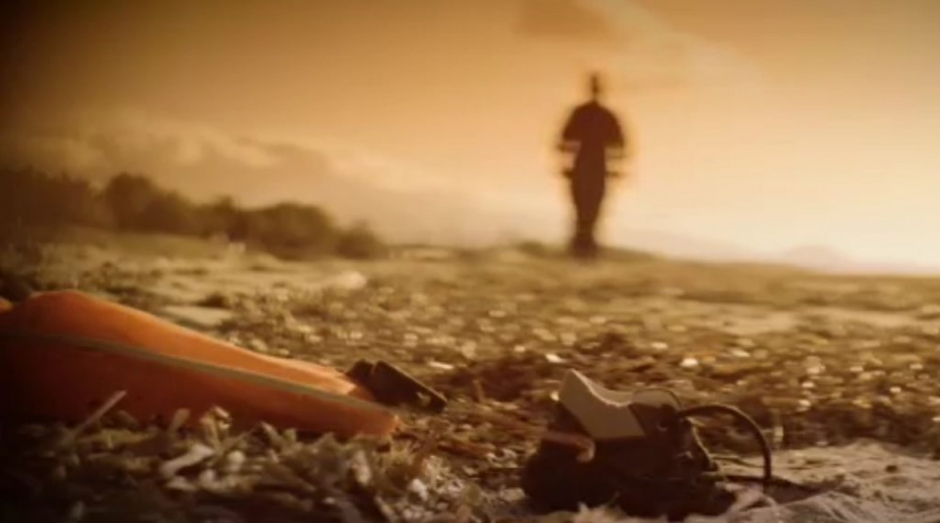The Island, The Sea, The Volunteer & The Refugee, directed by Susan Roberts for PUSH festival 2017; HOME, January 15 2017.
When we were handed our tickets we were told to hold onto them tightly; they were our papers, and we would need them to cross the border into Kos. The lift opened and a man holding a gun stepped out. He had us line up against the wall and then he ushered us inside, counting us as we passed him. We exited the lift and were led into a dark corridor, a voice at the far end calling us, a torchlight aimed at our eyes. And then we made our way carefully, checking around every corner, until we were led into a room and given stuffed Ikea bags and upturned crates to sit on, the lucky three or four among us finding a chair with a back to it. The ‘Volunteer’ of the title (Louise Wallwein) handed us a plastic cup of water and a biscuit, and we settled down for the show.
As far as is possible when you are in a multi-million pound entertainment complex, the cast and crew had begun to immerse us in the world of the refugees that have fled from their homes in countries such as Syria, Afghanistan, Pakistan, and Iraq, and ended up in the camps of Kos. The room in which the play is acted out is nothing more than a storeroom at the back of the building. The shelves are jam-packed with real artefacts from the camps, from dusty lifejackets to donated stilettoes. And the sense of reality is increased even further when filmed images of arriving refugees are streamed across the walls.
There is a withdrawal from this attempt at authenticity, though, when the play itself begins. Poems written and performed by Wallwein make up almost fifty percent of the performance, and they vary in affect and quality. At times they are powerful enough to move the audience to tears, but at others they make the artifice all too obvious and we are briefly pulled away from the sense of claustrophobia that is key to the play’s success. Interspersed between the poems are real-life testimony and verbatim interviews performed by Wallwein and Sushil Chudasama, and these are inevitably the most distressing sections of the show. Probably the most emotionally charged moment of the whole performance is when we hear from the perspective of the rescue worker who found the body of Alan Kurdi, the young Syrian boy whose body washed up on the beach back in September 2015. Other moments compete with this, though, and the horror that so many refugees have gone through in recent years is vividly brought to the stage. The production deserves plaudits for the striking and original way in which it retold these stories, it’s just unfortunate that most of those who would pay to see a play like this are those who least need to learn the lessons it is teaching.
It is a shame to offer any criticism of a production that had such admirable intentions, but perhaps they didn’t quite push things far enough. The initial intent to put you in the shoes of the refugees was an interesting twist, and one that felt successful for the short while in which you were in the middle of it. But as the play progressed the immersive nature of its beginning became lost, and with it went some of the originality. It would be silly to review a play that doesn’t actually exist, but it isn’t too much of a stretch to imagine a version of The Island, The Sea, The Volunteer & The Refugee, that kept you in the midst of the immigrant journey throughout. The version that we did get, though, was not at all without its merits. At its best it was extremely moving and a stark reminder of the everyday reality of people who have to flee their homelands, and the heroics of those people and the volunteers who give their time to help them.

